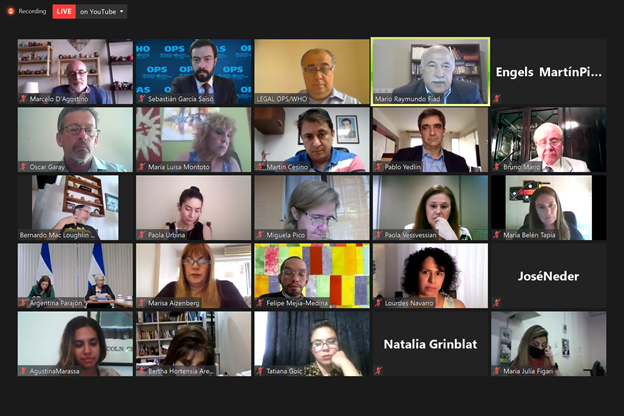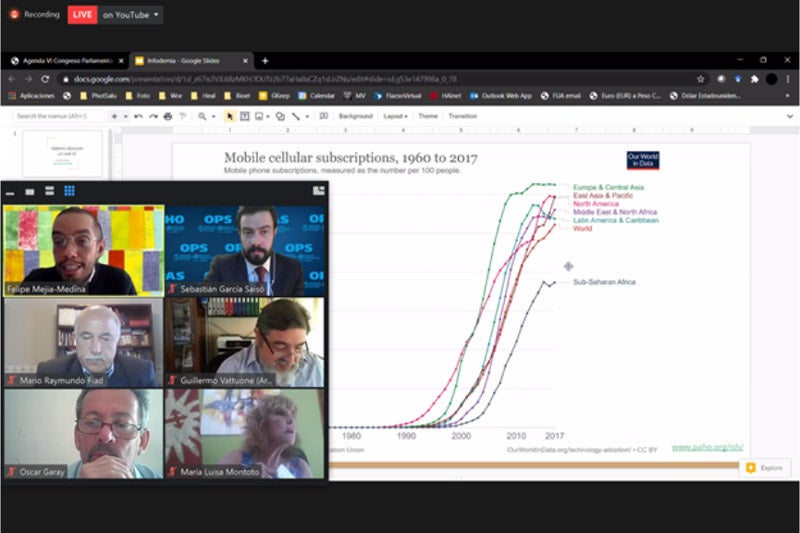While COVID-19 causes disruptions and challenges in health systems around the world, the Health Commissions of the Parliaments of the Americas together with the Pan American Health Organization (PAHO) work hard to make digital transformation a sustainable reality in the post-pandemic.
Buenos Aires, November 13, 2020 (PAHO). Parliamentarians of the Americas and PAHO have discussed and agreed today on the need to have laws prepared to ensure the generation and use of critical data for a better response to the pandemic, as well as to be able to understand and act on the effect known as “Infodemic "Which has generated" a pandemic within the pandemic ", as expressed by Senator Mario Fiad, President of the Health Commission of the Senate of the Argentine Nation, during the event.
Since June 2015, at the initiative of the Health and Population Commission of the Congress of the Republic of Peru and with the support of PAHO, the Health Commissions of the Parliaments of the Americas have met annually with the vision of creating a space for knowledge, analysis and exchange of experiences on topics of interest in health legislation; identify common critical aspects that affect the quality of life of the continent's population; and strengthen the capacities of parliamentarians in the preparation and approval of legal frameworks in accordance with public policies that allow the full exercise of the right to health.

"The pandemic has had devastating effects on health services and, in particular, on populations in vulnerable situations, however, information and communication technologies present us with an unprecedented opportunity to leave no one behind," he said. Dr. Sebastián García Saisó, Director of the Department of Evidence and Intelligence for Action in Health of PAHO.
In recent years, considerable progress has been made in the adoption of information and communication technologies for the benefit of the health sector; however, the speed of this process was not directly proportional to the updating of the necessary legal instruments. "It is important to bear in mind that the great technological advances, mainly those that must be assimilated very quickly, produce important challenges, and often unprecedented, for health law," said Deputy Yedlin during the session. On the other hand, Dr. Ignacio Ibarra, PAHO advisor for health legislation, highlighted the importance of normative instruments accompanying the digital transformation processes, ensuring the principles of law but also ensuring that new barriers do not arise for the speed required by this new era called "Interdependence Digital".
Finally, all the participants of the event agreed that if they can understand the challenges associated with access to critical data and support this process with modern regulatory instruments, it will be possible to improve the functioning of health systems, as well as the formulation of informed public policies like never before. before in the history of mankind.
"Legislation to improve informed decisions and consider health data as global public goods should be one of the critical factors for success," Garcia said in the closing remarks.

The event featured keynote presentations by Rafael Lozano, Director of Health Systems at the Institute for Health Metrics and Evaluation at the University of Washington in Seattle, United States; Bruno Mario, President of the Argentine Society of Medical Journalism; Felipe Mena Medina, PAHO International Consultant and Professor in Infodemic Issues, University of Heidelberg, Germany; Dr. Leonid Lecca, Director of the civil society organization Partners in Health, Professor in the Department of Global Health and Social Medicine at the Harvard School of Public Health and Marcelo DAgostino, PAHO Advisor for Information Systems and Digital Health. The last virtual session of this year will take place on December 4.
The closing was in charge of the Deputy Pablo Raúl Yedlin, President of the Commission of Social Action and Public Health, Honorable Chamber of Deputies of the Argentine Nation and Senator Mario Raymundo Fiad, President of the Health Commission of the Honorable Senate of the Nation of Argentina, who are the hosts of the VI Congress of Health Commissions of the Americas, of which PAHO is the technical secretariat.
For more information, visit this link.
With the support of a PAHO/WHO grant for Information Systems for Health (IS4H), a new solar-powered, web-based patient management information system has been developed by Medical Mission (MM). This NGO has provided for the past decades primary health services to very remote communities in the Suriname hinterland.
The digital and mobile health technology system will link and track patients who receive health services from the MM's 50 clinics. Also the system will enable an improvement in the quality of data used for decision making by their health care providers and program managers. When fully operational, it will allow real time data to be collected, registered and reported. Additionally, the system will facilitate more prompt and efficient action in response to public health emergencies and disasters.

Medical Mission's project was one of the winners of the call for proposals for the implementation of IS4H projects promoted by the Pan American Health Organization.
The MM patient management information system contains 5 modules: electronic medical records (EMR), drug management, laboratory services, patient waiting room management and consolidated health reports. The EMR provides the medical doctor, who in general is not on location, access to patient records whenever needed, while the drug management module monitors drugs dispensed to each patient as well as overall stock at each clinic. Through the laboratory module, patient data is linked with results from lab tests. The patient waiting room module gives an overview of the number of patients in the waiting room and their average waiting time, while consolidated health reports for each clinic can also be retrieved from the information system. A mini webserver will be installed at outpatient clinics and the server will be connected to a host, based at MM's central office in Paramaribo.
The aim is to provide as many of the 50 outpatient clinics in the districts and the interior with this new information system. "We currently have a data system…," says Melvin Uiterloo, Public Health Officer of MM. "in which all 50 clinics e-mail part information to us, we print it out and re-enter it in the computer. So we do not make good use of our human resources. We came up with the idea of having people in the field enter the information directly into a web-based system. Now it is possible to record patient data. The doctor can see more often what is going on, even if the patient comes to Paramaribo. We now have a better view of how the delivery of medicines is and how much medicines to order each month and to which outpatient clinic they should be sent. We have a better management system, we have insight into which lab tests have been performed," says Uiterloo. He sees the new information system as an opportunity to improve the service to people in the interior of Suriname.
In November 2019 Ms. Leah-Mari Richards, Advisor, Health Systems and Services of PAHO Suriname made a project monitoring trip regarding the implementation of this new digital health technology (web-based patient management information system). She was accompanied by the project led Mr. Uiterloo. The first field-testing of the information system was done in two indigenous peoples villages: Powakka and Pikin Saron in the district of Brokopondo, approximately one and a half hour's drive from Paramaribo. The patient waiting room of Pinkin Saron was crowded, because the doctor paid a visit. The villagers were waiting patiently for their turn to be helped by the Health Assistants who are under the supervision of a doctor and are trained to work with the system.
Both the Health Assistants of Pikin Saron and Powakka faced some challenges with entering the data on an Ipad charged by solar panels. "We use low voltage devices because we have solar panels and an inverter. That's why we cannot install a computer, but only use iPad that uses less power," Uiterloo explains. Ms. Rieneke Joghie, health assistant in the village of Pikin Saron is not that handy with the system yet. "Sometimes the iPad is stuck and then I need a little more time to search patient data. Certain people cannot wait and leave. Eventually they will come back. For the rest it works. It is a matter of getting used to it". On site, Uiterloo showed the health assistants how to operate the system efficiently.
Richards, was pleased with the progress thus far in implementing the system. "What we have found through this grant is the need to approach implementation slowly – testing the system and how it functions with internet connection and electricity issues, but also, testing the receptivity of this new way of working among the staff of Medical Mission. We are taking time to train the staff to operate the system so that over time, they can capture the data in a faster way," says Richards, elaborating further on the health information system and what she has seen in the field.
This support to Medical Mission in the area of IS4H is instrumental to the wider transformation that is underway at a national level to use technology more efficiently, to capture data, track patients, and improve overall patient management in Suriname. Medical Mission's project was one of the winners of the call for proposals for the implementation of IS4H projects promoted by the Pan American Health Organization.


